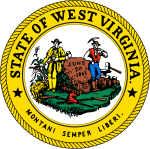The Democratic Senatorial Campaign Committee (DSCC) is the Democratic Hill committee for the United States Senate. It is the only organization solely dedicated to electing Democrats to the United States Senate. The DSCC's current Chair is Senator Gary Peters of Michigan, who succeeded Nevada‘s Catherine Cortez Masto after the 2020 Senate elections. DSCC's current executive director is Christie Roberts.

The 1976 United States Senate elections was an election for the United States Senate. Held on November 2, the 33 seats of Class 1 were contested in regular elections. They coincided with Democrat Jimmy Carter's presidential election and the United States Bicentennial celebration. Although almost half of the seats decided in this election changed parties, Carter's narrow victory did not provide coattails for the Democratic Party. Each party flipped seven Senate seats, although, one of the seats flipped by Democrats was previously held by a Conservative.

The 1970 United States Senate elections was an election for the United States Senate. It took place on November 3, with the 33 seats of Class 1 contested in regular elections. Special elections were also held to fill vacancies. These races occurred in the middle of Richard Nixon's first term as president. The Democrats lost a net of three seats, while the Republicans and the Conservative Party of New York picked up one net seat each, and former Democrat Harry F. Byrd Jr. was re-elected as an independent.

The 1960 United States Senate elections coincided with the election of John F. Kennedy as president on November 8, 1960. The 33 seats of Class 2 were contested in regular elections. A special election was also held on June 28, 1960, for a mid-term vacancy in North Dakota where Democrats flipped a seat to expand their majority to 66–34. As Majority Leader Lyndon Johnson was elected Vice President, Mike Mansfield became the new majority leader.

The 1958 United States Senate elections were elections for the United States Senate which occurred in the middle of President Dwight D. Eisenhower's second term. Thirty-two seats of Class 1 were contested in regular elections, the new state of Alaska held its first Senate elections for its Class 2 and 3 seats, and two special elections were held to fill vacancies.
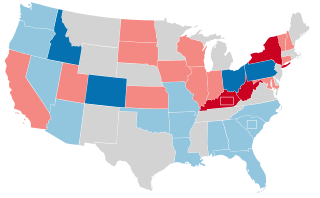
The 1956 United States Senate elections were elections for the United States Senate that coincided with the re-election of President Dwight D. Eisenhower. The 32 seats of Class 3 were contested in regular elections, and three special elections were held to fill vacancies. Although Democrats gained two seats in regular elections, the Republicans gained two seats in special elections, leaving the party balance of the chamber unchanged.

The 1946 United States Senate elections were held November 5, 1946, in the middle of Democratic President Harry S. Truman's first term after Roosevelt's passing. The 32 seats of Class 1 were contested in regular elections, and four special elections were held to fill vacancies. The Republicans took control of the Senate by picking up twelve seats, mostly from the Democrats. This was the first time since 1932 that the Republicans had held the Senate, recovering from a low of 16 seats following the 1936 Senate elections.

The 1934 United States Senate elections were held in the middle of Democratic President Franklin D. Roosevelt's first term. The 32 seats of Class 1 were contested in regular elections, and special elections were held to fill vacancies. During the Great Depression, voters strongly backed Roosevelt's New Deal and his allies in the Senate, with Democrats picking up a net of nine seats, giving them a supermajority. Republicans later lost three more seats due to mid-term vacancies, however, a Democratic in Iowa died and the seat remained vacant until the next election. Democrats' entered the next election with a 70-22-2-1 majority.
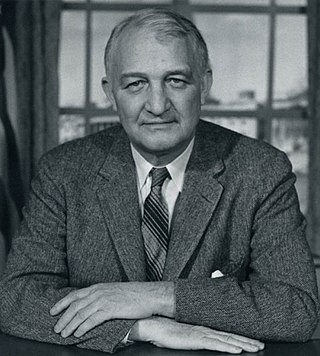
William Chapman Revercomb was an American politician and lawyer. A Republican, he served two separate terms in the United States Senate representing the state of West Virginia.

The 2006 United States Senate election in West Virginia was held November 7, 2006. Incumbent Democrat Robert Byrd won re-election to a ninth term. He was sworn in on January 3, 2007. However, he died in office on June 28, 2010, before the end of his term. This was Byrd's closest re-election.
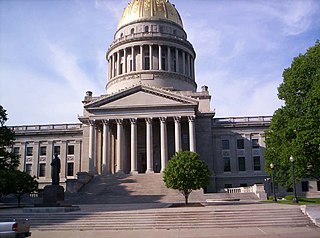
From the time of the Great Depression through the 1990s, the politics of West Virginia were largely dominated by the Democratic Party. In the 2000 presidential election, George W. Bush claimed a surprise victory over Al Gore, with 52% of the vote; he won West Virginia again in 2004, with 56% of the vote. West Virginia is now a heavily Republican state, with John McCain winning the state in 2008, Mitt Romney in 2012 and Donald Trump in 2016 and 2020.

The 2010 United States elections were held on Tuesday, November 2, 2010, in the middle of Democratic President Barack Obama's first term. Republicans ended unified Democratic control of Congress and the presidency by winning a majority in the House of Representatives and gained seats in the Senate despite Democrats holding Senate control.

The 2002 United States elections were held on November 5, in the middle of Republican President George W. Bush's first term. Republicans won unified control of Congress, picking up seats in both chambers of Congress, making Bush the first President since Franklin D. Roosevelt in 1934 to gain seats in both houses of Congress. In the gubernatorial elections, Democrats won a net gain of one seat. The elections were held just a little under fourteen months after the September 11 attacks. Thus, the elections were heavily overshadowed by the War on Terror, the impending Iraq War, the early 2000s recession, and the sudden death of Democratic Senator Paul Wellstone of Minnesota about one week before the election.

Elections were held in West Virginia on November 2, 2010. Primary elections took place on May 11, 2010.

The 1898–99 United States Senate elections were held on various dates in various states. As these U.S. Senate elections were prior to the ratification of the Seventeenth Amendment in 1913, senators were chosen by state legislatures. Senators were elected over a wide range of time throughout 1898 and 1899, and a seat may have been filled months late or remained vacant due to legislative deadlock. In these elections, terms were up for the senators in Class 1.
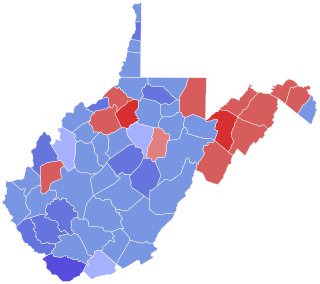
The 2010 United States Senate special election in West Virginia was held on November 2, 2010. Incumbent Democratic Senator Robert Byrd died in office on June 28, 2010. Democratic Governor Joe Manchin appointed Carte Goodwin to temporarily fill the vacancy. Goodwin pledged to not run for election to the seat in exchange for the appointment. This was the first open U.S. Senate seat in West Virginia since 1984 and the first in this seat since 1956. Manchin won the open seat and served out the remainder of Byrd's elected term, which ended on January 3, 2013.

The 1966 United States Senate election in Virginia was held on November 8, 1966. Senator A. Willis Robertson ran for re-election to a fourth term in office but was defeated in the Democratic primary by State Senator William B. Spong Jr. Spong then defeated Republican James Ould and Independent F. Lee Hawthorne in the general election.

The 1958 United States Senate special election in West Virginia was held on November 4, 1958, concurrent with a regular election. The election was called due to the death of Senator Matthew M. Neely.
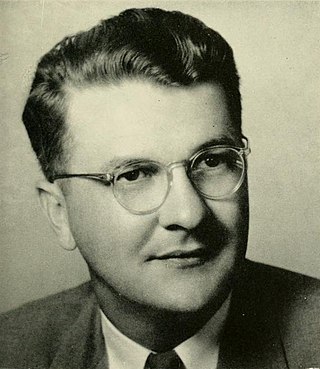
The 1956 United States Senate special election in West Virginia took place on November 6, 1956, to elect a U.S. Senator to complete the unexpired term of Senator Harley M. Kilgore, who died on February 28. 1956. State Tax Commissioner William Laird III was appointed to fill this seat by Governor William C. Marland to fill the vacancy until a special election could be held and assumed office on March 13, 1956.

Elections were held in Illinois on Tuesday, November 2, 1976.

